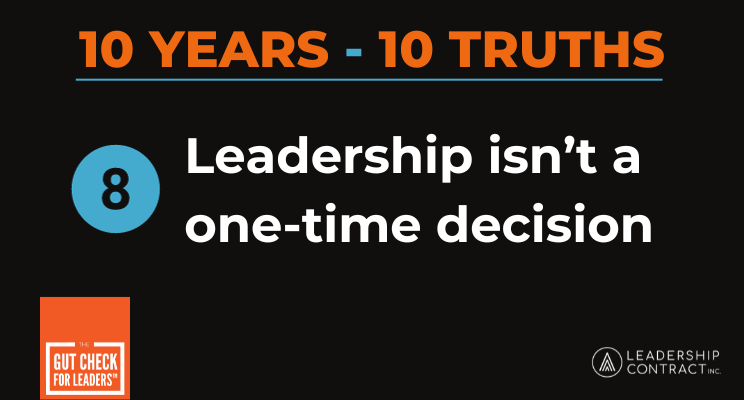8: Leadership isn’t a one-time decision
In the eighth installment of my 10 Years – 10 Truths series, I reflect on the fact that being a leader requires a constant reevaluation of your commitment to the role and doing what is necessary to drive the success of your organization.
 In my book, The Leadership Contract, I set out the four terms of the unspoken contract that every one of us agreed to when we first became leaders. They are essential to help us develop the mindset and demonstrate the behaviors of accountable leaders.
In my book, The Leadership Contract, I set out the four terms of the unspoken contract that every one of us agreed to when we first became leaders. They are essential to help us develop the mindset and demonstrate the behaviors of accountable leaders.
The reason is clear. Any time an organization is responding to a series of strategic challenges, it immediately shifts the expectations of leaders. As the organization changes, so must the leaders. If they don’t, any momentum stalls.
You need to understand new things will be expected of you and in turn, you must take the time to reflect and recommit to your role as a leader. In many ways, a new leadership contract emerges. You will need to understand its new expectations and commit to setting the tone of accountability at three levels. First, you need to set the tone of accountability at an individual level. You must drive accountability within your team. And you must ensure there is strong shared accountability as you collaborate with other leaders across the organization.
It is important to understand that you can’t go around telling others to be accountable. It typically doesn’t work. A better approach is for you to first be an accountable leader because accountability breeds accountability.
Let’s look at the four terms of The Leadership Contract and how they can help you ensure you are stepping up to demonstrate strong individual accountability.
- Decision – Set the Tone of Accountability: Leaders must decide to commit to the organization’s changes and future goals, recognizing lack of buy-in and commitment can obstruct progress. This involves deep reflection on whether one is prepared to be a part of the solution rather than a problem. It’s about a deliberate decision to be an example to your teams, peers, and colleagues.
- Obligation – Leave Things Better than You Found Them: All leadership roles demand that leaders step up to their obligations and responsibilities. This entails being clear about what specific contributions you and your team must make to support the success of your organization.
- Hard Work – Build Resilience and Resolve: You must have the courage to tackle the challenges in your role and handle the difficult aspects of leadership head-on, yet too many leaders wimp out. They fail to understand the price that is paid when they avoid difficult things. It slows down execution. Problems fester and get worse. The same issues keep coming up repeatedly with no resolution. You will need a healthy dose of resilience and resolve to be effective.
- Community – Forge Strong Relationships: Leaders need to build and maintain strong relationships with their peers. Collaborating with fellow leaders and having a support system in place are essential for success. Many leaders tell me they are isolated and struggle to form meaningful relationships with peers. In the end, this just makes an already demanding role more difficult than it needs to be.
Check out the newest and updated edition of my book, The Leadership Contract:
More Leadership Resources
We have many resources to help you scale leadership accountability across your organization.
Signup for our monthly newsletter with the latest Gut Check for Leaders, Lead the Future Podcast, and other important leadership accountability news.





